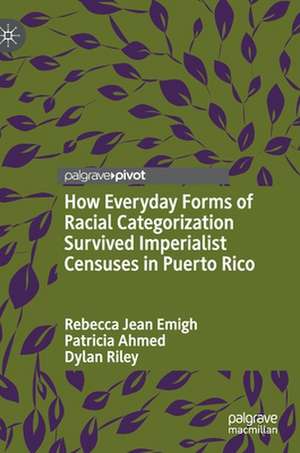How Everyday Forms of Racial Categorization Survived Imperialist Censuses in Puerto Rico
Autor Rebecca Jean Emigh, Patricia Ahmed, Dylan Rileyen Limba Engleză Hardback – 30 sep 2021
Preț: 441.83 lei
Nou
Puncte Express: 663
Preț estimativ în valută:
84.58€ • 86.99$ • 70.17£
84.58€ • 86.99$ • 70.17£
Carte tipărită la comandă
Livrare economică 18 februarie-04 martie
Preluare comenzi: 021 569.72.76
Specificații
ISBN-13: 9783030825171
ISBN-10: 3030825175
Pagini: 80
Ilustrații: IX, 109 p.
Dimensiuni: 148 x 210 mm
Greutate: 0.3 kg
Ediția:1st ed. 2021
Editura: Springer International Publishing
Colecția Palgrave Macmillan
Locul publicării:Cham, Switzerland
ISBN-10: 3030825175
Pagini: 80
Ilustrații: IX, 109 p.
Dimensiuni: 148 x 210 mm
Greutate: 0.3 kg
Ediția:1st ed. 2021
Editura: Springer International Publishing
Colecția Palgrave Macmillan
Locul publicării:Cham, Switzerland
Cuprins
Chapter 1: Potential of Censuses to Transformation Categorization.- Chapter 2: Methods.- Chapter 3: Spanish Mercantilist Censuses.- Chapter 4: Spanish Imperialist Censuses.- Chapter 5: US Imperialist Censuses.- Chapter 6: Assessing Explanations of Transformations in Categories.
Notă biografică
Rebecca Jean Emigh is Professor of Sociology at the University of California, Los Angeles, USA. She studies long-term processes of social change, particularly how cultural, economic, and demographic factors intersect to create those processes. With Dylan Riley and Patricia Ahmed, she is the author of Antecedents of Censuses from Medieval to Nation States: How Societies and States Count and Changes in Censuses from Imperialist to Welfare States: How Societies and States Count.
Patricia Ahmed is Senior Lecturer in Sociology at South Dakota State University, USA. Her research interests include comparative/historical sociology, cross-cultural sociology, and globalization.
Dylan Riley is Professor of Sociology at the University of California, Berkeley, USA. He studies capitalism, socialism, democracy, authoritarianism, and knowledge regimes in a broad comparative and historical perspective.
Dylan Riley is Professor of Sociology at the University of California, Berkeley, USA. He studies capitalism, socialism, democracy, authoritarianism, and knowledge regimes in a broad comparative and historical perspective.
Textul de pe ultima copertă
“By looking at the complex history of the colonial censuses in Puerto Rico, this book offers rare insights into the politics of the census and the limits of empire’s classificatory schemes to transform colonized people’s everyday categories.”
—Julian Go, Professor of Sociology, The University of Chicago
“Concise and convincing, this book showcases how daily practices have the power to subvert powerful imperialist states. The book—analyzing state censuses in Puerto Rico from 1530 to the 21st century—is a welcoming addition to the literature of empire, race relations, and day-to-day racial practices. Definitively, a must read!”
—Rosa Elena Carrasquillo, Professor of Caribbean/Latin American History, College of the Holy Cross
—Julian Go, Professor of Sociology, The University of Chicago
“Concise and convincing, this book showcases how daily practices have the power to subvert powerful imperialist states. The book—analyzing state censuses in Puerto Rico from 1530 to the 21st century—is a welcoming addition to the literature of empire, race relations, and day-to-day racial practices. Definitively, a must read!”
—Rosa Elena Carrasquillo, Professor of Caribbean/Latin American History, College of the Holy Cross
This book examines the history of racial classifications in Puerto Rico censuses, starting with the Spanish censuses and continuing through the US ones. Because Puerto Rican censuses were collected regularly over hundreds of years, they are fascinating “test cases” to see what census categories might have been available and effective in shaping everyday ones. Published twentieth-century censuses have been well studied, but this book also examines unpublished documents in previous centuries to understand the historical precursors of contemporary ones. State-centered theories hypothesize that censuses, especially colonial ones, have powerful transformative effects. In contrast, this book shows that such transformations are affected by the power and interests of social actors, not the strength of the state. Thus, despite hundreds of years of exposure to the official dichotomous and trichotomous census categories, these categories never replaced the continuous everyday ones because the census categories rarely coincided with Puerto Rican’s interests.
Rebecca Jean Emigh is Professor of Sociology at the University of California, Los Angeles, USA.
Patricia Ahmed is Senior Lecturer in Sociology at South Dakota State University, USA.
Dylan Riley is Professor of Sociology at the University of California, Berkeley, USA.
Patricia Ahmed is Senior Lecturer in Sociology at South Dakota State University, USA.
Dylan Riley is Professor of Sociology at the University of California, Berkeley, USA.
Caracteristici
Challenges the assumption that states are all-powerful in terms of classifying and enumerating their population Examines the role of lay understandings of the social world in crafting meaningful census categories Contributes to sociology, Latin American Studies, studies of race and ethnicity, and beyond
